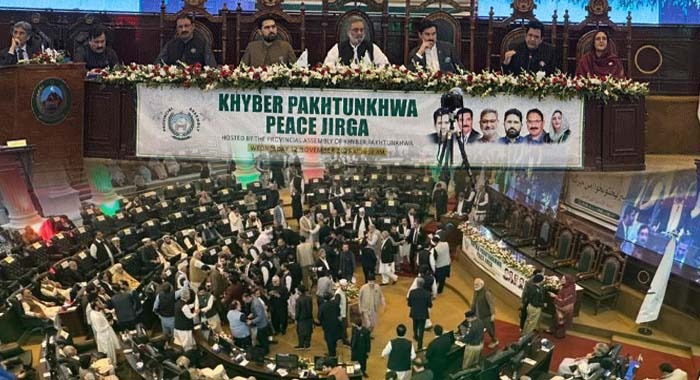The Khyber Pakhtunkhwa (KP) government has released the joint statement of the peace jirga convened to address the province’s security and governance issues. The jirga condemned terrorism and called for coordinated measures to eliminate it, including involving the Provincial Assembly in key decisions and assigning primary internal security responsibilities to the police and Counter-Terrorism Department (CTD).
The peace jirga also recommended the removal of unnecessary security posts, the prevention of illegal mineral extraction and smuggling in KP and other conflict-affected areas, and the opening of trade routes along the Pak-Afghan border. Furthermore, it urged that foreign policy decisions involving Afghanistan should be made in consultation with the provincial government, and a provincial action plan should be formulated in coordination with the Provincial Assembly.
The jirga was hosted by Speaker Babar Saleem Swati and attended by KP Chief Minister Suhail Afridi, Governor Faisal Karim Kundi, former chief ministers, provincial assembly members, leadership of more than 20 political parties, lawyers, traders, and media representatives. Following the submission of proposals by the participants, the joint statement was formally read out by the Speaker.
According to the statement:
The jirga strongly condemns terrorism and emphasizes that all anti-terrorism measures should be implemented in consultation with the Provincial Assembly to ensure lasting peace.
It called for the immediate enforcement of provincial assembly resolutions on public safety.
The police and CTD will take the lead in maintaining security, and they may seek support from other constitutional institutions as required.
The provincial government should provide special financial support to law enforcement agencies to strengthen their operations.
Additional recommendations include:
Immediate reopening of all historical and trade routes along the Pak-Afghan border.
Consultation between federal and provincial governments on foreign policy matters, with diplomacy prioritized.
Reduction of tensions between federal and provincial governments and timely convening of the Council of Common Interests.
Formulation of coordinated policies to eliminate illegal taxes and extortion.
Ending illegal mineral extraction in conflict-affected areas of KP.
Providing in-camera briefings to the Provincial Assembly on security operations conducted by law enforcement agencies.
Establishment of provincial peace forums with a majority of non-governmental members to strengthen community-level governance.
Formation of coordination cells between police, cantonments, and local governments to improve public safety and manage the removal of unnecessary check posts.
Strengthening local governments through legislative amendments and financial protection, linking the National Finance Commission with the provincial finance system.
Ensuring that federal authorities allocate KP’s constitutional financial rights, and enforcing Article 151 to facilitate interprovincial trade, including the smooth supply of essential commodities like wheat.





